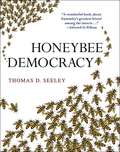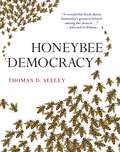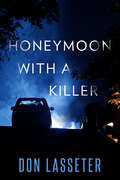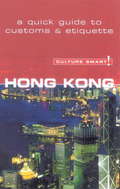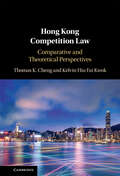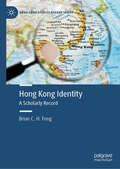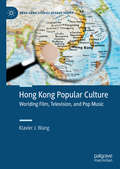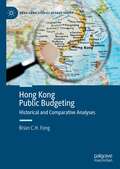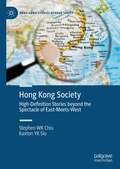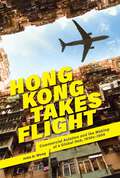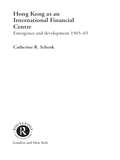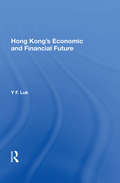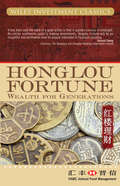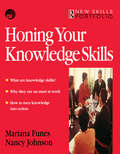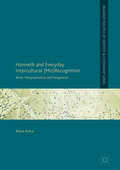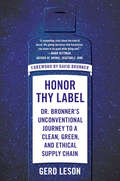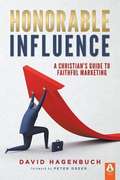- Table View
- List View
Honeybee Democracy
by Thomas D. SeeleyHoneybees make decisions collectively--and democratically. Every year, faced with the life-or-death problem of choosing and traveling to a new home, honeybees stake everything on a process that includes collective fact-finding, vigorous debate, and consensus building. In fact, as world-renowned animal behaviorist Thomas Seeley reveals, these incredible insects have much to teach us when it comes to collective wisdom and effective decision making. A remarkable and richly illustrated account of scientific discovery, Honeybee Democracy brings together, for the first time, decades of Seeley's pioneering research to tell the amazing story of house hunting and democratic debate among the honeybees. In the late spring and early summer, as a bee colony becomes overcrowded, a third of the hive stays behind and rears a new queen, while a swarm of thousands departs with the old queen to produce a daughter colony. Seeley describes how these bees evaluate potential nest sites, advertise their discoveries to one another, engage in open deliberation, choose a final site, and navigate together--as a swirling cloud of bees--to their new home. Seeley investigates how evolution has honed the decision-making methods of honeybees over millions of years, and he considers similarities between the ways that bee swarms and primate brains process information. He concludes that what works well for bees can also work well for people: any decision-making group should consist of individuals with shared interests and mutual respect, a leader's influence should be minimized, debate should be relied upon, diverse solutions should be sought, and the majority should be counted on for a dependable resolution. An impressive exploration of animal behavior, Honeybee Democracy shows that decision-making groups, whether honeybee or human, can be smarter than even the smartest individuals in them.
Honeybee Democracy
by Thomas D. SeeleyHow honeybees make collective decisions—and what we can learn from this amazing democratic processHoneybees make decisions collectively—and democratically. Every year, faced with the life-or-death problem of choosing and traveling to a new home, honeybees stake everything on a process that includes collective fact-finding, vigorous debate, and consensus building. In fact, as world-renowned animal behaviorist Thomas Seeley reveals, these incredible insects have much to teach us when it comes to collective wisdom and effective decision making. A remarkable and richly illustrated account of scientific discovery, Honeybee Democracy brings together, for the first time, decades of Seeley's pioneering research to tell the amazing story of house hunting and democratic debate among the honeybees.In the late spring and early summer, as a bee colony becomes overcrowded, a third of the hive stays behind and rears a new queen, while a swarm of thousands departs with the old queen to produce a daughter colony. Seeley describes how these bees evaluate potential nest sites, advertise their discoveries to one another, engage in open deliberation, choose a final site, and navigate together—as a swirling cloud of bees—to their new home. Seeley investigates how evolution has honed the decision-making methods of honeybees over millions of years, and he considers similarities between the ways that bee swarms and primate brains process information. He concludes that what works well for bees can also work well for people: any decision-making group should consist of individuals with shared interests and mutual respect, a leader's influence should be minimized, debate should be relied upon, diverse solutions should be sought, and the majority should be counted on for a dependable resolution.An impressive exploration of animal behavior, Honeybee Democracy shows that decision-making groups, whether honeybee or human, can be smarter than even the smartest individuals in them.
Honeymoon With A Killer
by Don Lasseter Ronald E. BowersThe shocking true crime story of a California bride who took her wealthy husband for everything he had—including his life.Everything She Wanted . . .Rebecca Salcedo had an easy smile, a sexy body, and strong appetites—she wanted the world. Bruce Cleland, she decided, would buy it for her. The shy engineer quickly fell victim to her charms, getting her whatever she wanted. A new car. A boat. A house. But he wasn&’t Rebecca&’s only admirer . . .She Got . . .Even after Rebecca manipulated Bruce into marrying her, hoping to divorce him and take him for everything he had, she occupied herself with a series of lovers. Male strippers, women . . . they all spent time in Rebecca&’s bed. But when she learned that a divorce would only get her a few pennies, she knew she had to find another way to secure Bruce&’s fortune.Even Murder . . .Enlisting two family members as killers-for-hire, Rebecca set in motion her solution to the problem. While she watched, the first bullet hit Bruce in the face. Three more would follow. But while Rebecca kept the blood off her hands, she could not conceal evidence that led straight to her, culminating in a trial that would shock a community.With sixteen pages of shocking photosPraise for Honeymoon with a Killer&“The sordid tale of an innocent man and the woman who plotted his murder. . . . Lasseter and Bowers provide readers with a highly detailed depiction of events leading up to and following the gruesome murder of Bruce Cleland. True crime aficionados will savor this riveting read.&” —Publishers Weekly, starred review
Honeywell and the Great Recession (A)
by Sandra J. Sucher Susan WinterbergCEO Dave Cote spent six years turning around an ailing Honeywell and in 2008 Cote and his team face a new challenge: how to respond to the Great Recession. Cote does not want to give up the gains he made in transforming and unifying Honeywell. With a fall-off in demand, Cote and the team must decide how to enact spending cuts in all parts of the business. They face choices in whether to employ layoffs or furloughs (unpaid leaves) for any needed workforce reductions, and whether to enact hiring freezes and other cost-saving changes to employee and executive compensation programs and benefits. Each of these choices is hard, and together they may derail the company's momentum if not handled carefully.
Honeywell and the Great Recession: The Economic Recovery (B)
by Sandra J. Sucher Susan WinterbergFive years after the Great Recession, Honeywell's CEO Dave Cote and his executive team reflect on the choices they made to manage costs and earnings forecasts during that uncertain time. They discuss which cost cutting measures they decided to take and their personal decisions of whether or not to accept bonuses in 2009. Cote also discusses the challenges Honeywell faced implementing unpaid work leaves (furloughs) in different parts of the world and how he believes the choices they made during the recession positioned Honeywell to respond to the economic recovery.
Honeywell, Inc. and Integrated Risk Management
by Jonathan Barnett Lisa MeulbroekHoneywell was the first to introduce an integrated risk management program that combined traditionally insured risks with other risks in an insurance contract. This case identifies the benefits of integrating risks and shows how such an approach might be valuable.
Honeywell: Transforming a Century Old Industrial
by William W. George Michael Norris John MaskoIn late 2021, Darius Adamczyk, Chairman and CEO of Honeywell is considering the changes he has made to the company since he took over the top leadership position in 2017. The company he had inherited from his predecessor, David Cote, was seen by most as a high-performing, successful operation. Rather than rest on that success, however, Adamczyk had made a series of major moves-spinouts, exits, mergers, and reorganizations to refocus and reposition Honeywell. Against the backdrop of the breakup of GE, which many considered to be Honeywell's peer, Adamczyk wonders if he has done enough to prepare Honeywell to compete in the 21st century.
Hong Kong - Culture Smart!
by Clare VickersCulture Smart! provides essential information on attitudes, beliefs and behavior in different countries, ensuring that you arrive at your destination aware of basic manners, common courtesies, and sensitive issues. These concise guides tell you what to expect, how to behave, and how to establish a rapport with your hosts. This inside knowledge will enable you to steer clear of embarrassing gaffes and mistakes, feel confident in unfamiliar situations, and develop trust, friendships, and successful business relationships.Culture Smart! offers illuminating insights into the culture and society of a particular country. It will help you to turn your visit-whether on business or for pleasure-into a memorable and enriching experience. Contents include* customs, values, and traditions* historical, religious, and political background* life at home* leisure, social, and cultural life* eating and drinking* dos, don'ts, and taboos* business practices* communication, spoken and unspoken"Culture Smart has come to the rescue of hapless travellers." Sunday Times Travel"... the perfect introduction to the weird, wonderful and downright odd quirks and customs of various countries." Global Travel"...full of fascinating-as well as common-sense-tips to help you avoid embarrassing faux pas." Observer"...as useful as they are entertaining." Easyjet Magazine"...offer glimpses into the psyche of a faraway world." New York Times
Hong Kong Competition Law: Comparative and Theoretical Perspectives
by Thomas K. Cheng Kelvin Hiu KwokThis is the first academic monograph on the new competition law in Hong Kong. It provides an overview of the historical background of the Competition Ordinance, highlighting the debate and the process that led to the adoption of the Ordinance. It offers detailed comparative and theoretical analysis of the key provisions of the Ordinance, focusing on the First Conduct Rule, the Second Conduct Rule, the exclusions and exemptions, and the procedural provisions. It draws on overseas legislation and jurisprudence that inspired the provisions in the Ordinance and incorporates a detailed examination of the latest cases decided by the Competition Tribunal. It engages in relevant academic debates and theoretical analysis of how competition law in Hong Kong should develop in light of its unique economic and political contexts. It concludes by setting forth of a set of recommendations for further reform.
Hong Kong Identity: A Scholarly Record (Hong Kong Studies Reader Series)
by Brian C. FongHong Kong Identity: A Scholarly Record is an empirical analysis of the city’s territorial identity politics. Placing the discussion firmly within comparative politics literature, this book endeavours to present the case study of Hong Kong’s territorial identity politics to both the local and international community. The book empirically traces the historical-political development of the “Hongkongers” identity from 1841 to 2020, with a focus on its evolution into a “collective action frame” since the mid-2010s. Through a number of original data collection—telephone surveys, extended interviews, macro-organisational analysis, organisational surveys, and protest event analysis—this book empirically addresses the research questions of who, why, and how people protested. It guides readers to understand and interpret Hong Kong’s territorial identity politics in a comparative and theoretical way. This book will be of key interest to scholars and students of comparative politics. Experienced political researchers in Hong Kong will find this book illuminating; while comparative political scholars worldwide would also find it a handy introductory text to the critical case of Hong Kong. This book is also an excellent resource for instructors and students of Asian Studies, China Studies, and Hong Kong Studies.
Hong Kong Popular Culture: Worlding Film, Television, and Pop Music (Hong Kong Studies Reader Series)
by Klavier J. WangThis book traces the evolution of the Hong Kong’s popular culture, namely film, television and popular music (also known as Cantopop), which is knotted with the city’s geo-political, economic and social transformations. Under various historical contingencies and due to the city’s special geo-politics, these three major popular cultural forms have experienced various worlding processes and have generated border-crossing impact culturally and socially. The worlding processes are greatly associated the city’s nature as a reception and departure port to Sinophone migrants and populations of multiethnic and multicultural. Reaching beyond the “golden age” (1980s) of Hong Kong popular culture and afar from a film-centric cultural narration, this book, delineating from the dawn of the 20th century and following a chronological order, untangles how the nowadays popular “Hong Kong film”, “Hong Kong TV” and “Cantopop” are derived from early-age Sinophone cultural heritage, re-shaped through cross-cultural hybridization and influenced by multiple political forces. Review of archives, existing literatures and corporation documents are supplemented with policy analysis and in-depth interviews to explore the centennial development of Hong Kong popular culture, which is by no means demise but at the juncture of critical transition.
Hong Kong Public Budgeting: Historical and Comparative Analyses (Hong Kong Studies Reader Series)
by Brian C. FongThis book is a comprehensive, scholarly account of Hong Kong Public Budgeting, spanning from the pre-1997 British rule to the post-1997 Chinese rule. Transcending the existing comparative budgeting studies which are either central-government focused or symmetric local-government focused, this book presents Hong Kong Public Budgeting as a distinctive case of territorial autonomy. It offers historical and comparative analyses of Hong Kong Public Budgeting, tracing the evolution of budgetary institutions and budgetary decision-making and examining the critical issues of budget openness, budget oversight, and budget allocation. This book will be of key interest to scholars and students of comparative budgeting studies. It will also be an excellent text for public budgeting instructors and students in East Asia and Hong Kong.
Hong Kong SAR: Meeting the Challenges of Integration with the Mainland
by William Lee Tao Wang Papa N'Diaye Hong Liang Dora Iakova Jorge Chan-Lau Ida LiuThis paper reviews recent trends and developments in the economic integration of the Hong Kong Special Administrative Region (SAR) into the Chinese economy, and key challenges remaining. The analysis is based on data available as of July 2003, and issues discussed include: the fiscal outlook and policy options, developments in the property market and housing prices, deflation dynamics, trends in wage inequality over the last two decades, and financial market developments.
Hong Kong Society: High-Definition Stories beyond the Spectacle of East-Meets-West (Hong Kong Studies Reader Series)
by Stephen WK Chiu Kaxton YK SiuThis book borrows the concept of “high-definition” from digital broadcasting to highlight our unique approach to Hong Kong society, which gives a sharper image than analyses. It intends to highlight contrasts with many common and taken-for-granted stories, myths and representations of Hong Kong— which often presented with a low level of detail, lacking proper connections between grounded personal experiences and the macro social context. With chapters covering various salient dimensions of Hong Kong’s society, including migration, economy, inequality, identity and social movements, our “high-definition” approach presents images with high enough “resolution” to match multiple layers of experiences from walks of life of Hong Kong people, contributing to an understanding of how global transformation impacts local people’s experiences, as well as Hong Kong’s significance in the regional and global system.
Hong Kong Takes Flight: Commercial Aviation and the Making of a Global Hub, 1930s–1998 (Harvard East Asian Monographs #454)
by John D. WongCommercial aviation took shape in Hong Kong as the city developed into a powerful economy. Rather than accepting air travel as an inevitability in the era of global mobility, John Wong argues that Hong Kong’s development into a regional and global airline hub was not preordained. By underscoring the shifting process through which this hub emerged, Hong Kong Takes Flight aims to describe globalization and global networks in the making. Viewing the globalization of the city through the prism of its airline industry, Wong examines how policymakers and businesses asserted themselves against international partners and competitors in a bid to accrue socioeconomic benefits, negotiated their interests in Hong Kong’s economic success, and articulated their expressions of modernity.
Hong Kong as an International Financial Centre: Emergence and Development, 1945-1965 (Routledge Studies In The Growth Economies Of Asia Ser.)
by Dr Catherine SchenkBased on previously unpublished archival records, this book studies the origins of Hong Kong's post war rise to global prominence. It explores the expansion of the gold market, stock market, banking system, foreign exchange market, and insurance in the years 1945-1965. This book makes a significant contribution to our understanding of the developme
Hong Kong's Economic And Financial Future
by Y. F. LukSIGNIFICANT ISSUES SERIES papers are written for and published by the Center for Strategic and International Studies. The series will present the insights of prominent East Asian analysts and draw conclusions about complementarities or divergences that may exist. Those insights, in tum, will serve in the aggregate as the basis for a richer, cross-
Hong Kong, China Growth, Structural Change, and Economic Stability During the Transition
by John Dodsworth Dubravko Mihaljek#Includes bibliographical references (p. ).
Honglou Fortune: Wealth For Generations (Wiley Investment Classics)
by HSBC Jintrust Fund ManagementMost economic writings fail to impress readers as they are often obscure and abstract. However, Honglou Fortune is the complete opposite. Using the characters from Honglou Meng, it conveys the true essence of wealth management through the simplest language. Honglou Fortune makes learning these concepts a joy and a pleasure to read. Even those who are not interested in wealth management will enjoy this book as a well-written literary piece. —Wang Biao, Deputy Editor-in-chief, Wealth Management Weekly Honglou Fortune cleverly depicts how the women in Honglou Meng engage in investment and wealth generation through techniques used in managing the household. The author, Rena He Hanxi, graduated with top honors from Fudan University's School of Economics. With a strong foundation in economics, she offers rare and valuable insight into the investment and financial schools of thought. —Zhang Jun, Professor, Fudan University School of Economics, Director, China Centre for Economic Research
Honing Your Knowledge Skills (Industrial Society New Skills Portfolio Ser.)
by Mariana Funes Nancy JohnsonNew technology and organizational structures are transforming the workplace, but management skills have not yet caught up. Harnessing knowledge and using it as a competitive advantage is one of the key priorities of organizations today. Honing Your Knowledge Skills looks at how to define knowledge working and identifies the practical skills of knowledge management needed by line managers. This book shows you how to *handle information overload *become an expert *harness new ideas *turn knowledge into action * keep knowledge skills fresh * understand IT resources and knowledge based systems The New Skills Portfolio is a groundbreaking new series, published in association with the Industrial Society, which re-defines the core management skills managers and team leaders need to be competitive. Each title is action-focused blending 20th century management initiatives/trends with a new flexible skills portfolio.The Industrial Society is one of the largest public training providers in the UK. It has over 10,000 member organisations and promotes best practice through its publishing, consultancy, training and advisory services. For more information contact their website on www.indsoc.co.uk
Honneth and Everyday Intercultural: Work, Marginalisation And Integration (Palgrave Politics Of Identity And Citizenship)
by Bona AnnaThis book conducts a critical investigation into everyday intercultural recognition and misrecognition in the domain of paid work, utilising social philosopher Axel Honneth’s recognition theory as its theoretical foundation. In so doing, it also reveals the sophistication and productivity of Honneth's recognition model for multiculturalism scholarship.Honneth and Everyday Intercultural (Mis)Recognition is concerned with the redress of intercultural related injustice and, more widely, the effective integration of ethically and culturally diverse societies. Bona Anna analyses the everyday experiences of cross-cultural misrecognition in a distinctive ethno-cultural group, including social norms that have been marginalised in the contexts of employment. In this endeavour, she deploys key constructs from Honneth’s theory to argue for individual and social integration to be conceptualised as a process of inclusion through stables forms of recognition, rather than as a process of inclusion through forms of group representation and participation. This book will appeal to students and academics of multiculturalism interested in learning more about the usefulness of Honneth’s recognition theory in intercultural inquiry, including the ways in which it can circumvent some of the impasses of classical multiculturalism.
Honor Foundation: Accessing Special Operations Talent
by Boris Groysberg John MaskoIn 2020, The Honor Foundation (THF), a nonprofit dedicated to helping U.S. military special operators to transition into civilian careers, was facing a series of strategic challenges. THF had been founded in 2013 by former Navy SEAL trainee Joe Musselman, who observed a disturbing pattern: once special operators left the military in their mid-30s or 40s, they tended to end up in jobs in which they were overqualified, underpaid, and unfulfilled. Musselman attributed this to fundamental disconnects between the world of special operations, whose members had unique and deep skill sets but little experience articulating them in the civilian world, and the world of business. THF's programs gave transitioning special operators space to reflect on what they wanted out of their transition, and hard skills for interviewing, resume writing, and networking. Over seven years, its three month program had grown to serve over 200 transitioners per year on three campuses plus a virtual campus. But in early 2020, THF was not yet serving America's largest contingent of special operators: the U.S. Army Special Forces. As the COVID-19 pandemic raged, THF CEO Matt Stevens was evaluating how best to incorporate Army special operators and fulfill THF's mission of serving all the U.S. special ops community. Should THF build another physical campus? Should it use its virtual campus to incorporate Army special operators instead? Or should it take on government funding to scale quickly? Students who read this case will evaluate this strategic problem while becoming familiar with the unique skills of the Special Operations Forces community.
Honor Thy Label: Dr. Bronner's Unconventional Journey to a Clean, Green, and Ethical Supply Chain
by Gero Leson&“A compelling story about the kind of moral, life-giving decisions that businesses can make to do good while doing well.&”—Mark Bittman, author of Animal, Vegetable, JunkWhat's in a label? For Dr. Bronner's, more than ingredients or intentions—it spells out an ethical commitment to fairness and sustainable growth, uniting consumers and companies worldwide. Dr. Bronner&’s Magic Soaps are renowned for their dense product labels (&“All-One!&”) and the curious tingling of peppermint. But how did this unusual natural soap transform the small print into soaring sales—inspiring customer loyalty not just with lather, but with good clean business? In Honor Thy Label, Dr. Bronner&’s head of Special Operations, Gero Leson, reveals the inside story of how a little-known family-run soap company grew from countercultural roots to create a revolutionary fair trade and organic supply chain from the ground up—and rode the waves of popular demand without losing sight of the process. Through stories of harrowing setbacks and hard-won triumphs in projects that spanned the globe, in Sri Lanka, Ghana, India, and beyond, Leson demystifies the process of building and scaling ethical production. And he proves that if done right, the results ripple outward to benefit customers, communities, and the environment we share. Told with spirit and conviction, Honor Thy Label invites socially conscious entrepreneurs and shoppers on a journey to break the boundaries of production with the pioneers of socially just business—spreading Dr. Bronner&’s radical vision of simple ingredients with cosmic impact.
Honorable Influence: A Christian's Guide to Faithful Marketing
by David HagenbuchFew things impact our lives more than marketing, yet few people consider how that influence can be a force for good. Honorable Influence shines the light of Christian faith on the field, revealing how marketers can avoid negative impact, and instead influence consumers to their benefit. Individuals and organizations will find in Honorable Influence practical guidance for doing what seems impossible to many-using marketing to show love to God and others.
